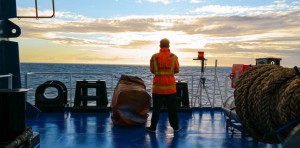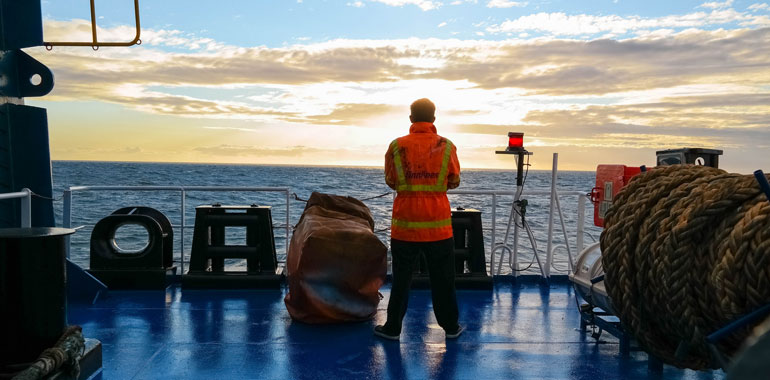
It is a strange time to be a professional mariner. This is true no matter what kind of vessel you sail on and no matter what specific difficulties your sector of the industry faces — overwork due to the difficulty of relieving crews, or underwork due to the massive drop-off in passenger traffic for much of the year. As the readers of Professional Mariner are all too aware, a pandemic respiratory virus is the kind of challenge almost tailor-made to turn the maritime industry upside down.
I myself sail on oceangoing tugs running between Puget Sound, Hawaii and western Alaska. In March, my employer sent me a letter that I was to carry when traveling to and from crew changes. This letter designates me as an “essential critical infrastructure worker,” not to be restricted in my movements while traveling for job-related reasons. While much of the world was to shelter from the COVID-19 pandemic, the critical infrastructure that keeps us fed, clothed, medicated and supplied with the essentials of modern life — the just-in-time logistical miracle of the 21st-century global supply chain — was to be kept humming along at all costs.
I consider myself very lucky to be in my present situation. I am employed and the rhythm of my working life has not changed much. I am much more fortunate than many of my brother and sister mariners in that my employer has continued crew changes on a more or less normal schedule. Which is not to say that nothing has changed. There are now questionnaires, temperature checks and self-isolation periods to be navigated between hitches. There is no shore leave for any reason except medical necessity. Everything smells like bleach and hand sanitizer. The sanitizer itself, for a while, was the stuff that craft distilleries have been making by way of doing their part. On one hitch it smelled like bad tequila. On another it had a definite odor of cheap bourbon.
We try to take reasonable precautions with our physical health, but if COVID-19 came aboard with us, there is not much we can do. We operate a long way from help and our available medical resources are very slender. As far as our mental health, the lack of access to shore leave and the uncertainty about crew changes have greatly exacerbated the stresses of loneliness and disconnection that have always been part of this profession.
Fortunately, smartphones and satellite communications have made the isolation of maritime life in the 21st century a great deal less stressful than it was 50 years ago, or even 10 years ago. Even so, every hitch is a voyage through time as well as space. I have joked to friends about entering the “Tugboat Time Machine” — we get on the boat, and when we get off the boat it may be an entirely different season. Holidays and anniversaries, weddings, births and funerals may have come and gone. The lives of loved ones may have changed in all sorts of ways while we were away. The strength of the effect varies, but I cannot recall ever coming home from a boat and not feeling at least a little bit like a time traveler emerging into an unfamiliar future.
Lately, this effect has been truly surreal. I came home from one hitch to find that the whole world seemingly had shut itself down because of the pandemic. I came home from another to find most of the country engulfed in massive demonstrations for racial justice. I came home from yet another to find both of the above, plus massive wildfires burning up and down the West Coast and my own town preparing to evacuate. I have stopped even trying to speculate about what the world will look like the next time I come home to it.
Of course, it does help to know that I can join my vessel and leave it again more or less when I expect to. Across the world in every sector of our industry, there are mariners trapped on their ships — unable to get a flight home or permission to even cross the gangway to get to an airport, even though their hitch should have ended months ago. Some mariners have now been aboard their vessels for as long as 17 months straight without relief or even token access to shore leave. Stranded mariners struggle deeply with feelings of loneliness and isolation, and they have a keen awareness of their separation from loved ones and life onshore.
I am not complaining about the rigors of the profession I have chosen, nor am I attempting to make any comparison between mariners and any other class of “essential worker.” If there are particular drawbacks to maritime work at this moment, there are compensations as well. At least in the American merchant marine we are not poorly paid or lacking benefits, as are many store cashiers, delivery drivers and warehouse workers. We are not on the front lines of the pandemic, as are medical personnel. There are actually few more effective ways to quarantine than to put to sea for a few weeks or months, interacting with the shore only when absolutely necessary to conduct ship’s business.
It is fair to say that we feel a faint sense of validation at the official recognition of our maritime transportation system as “critical infrastructure.” It does seem like the tenuous threads that bind our society together only get noticed when they start to fray. The invisible wheels that keep our world turning in the way that we expect have turned out to be truly delicate machinery. Those of us in the business of keeping the world moving can hardly ignore these threads and wheels. We are one of those threads; we turn some of those wheels. After all, 90 percent of global trade involves moving goods by ship.
The linchpin of the maritime industry, I think it is fair to say, is not hulls or machinery, but the “human element.” Or to put it less mechanistically, people. People who do a difficult job well, in fair weather or foul — literally and figuratively. People who carry the traditions of a seafaring profession that stretches across human history. People who are willing to step aboard their waterborne time machines, knowing that the world that will greet them when they step off the gangway again will not be the same as the one they left behind.
Now is a good time to remember that many of the mariners who keep this critical infrastructure operating, at risk to their physical and mental health from the pandemic and its repercussions, are not fairly compensated. Many mariners may not have a reasonable expectation of being repatriated at the end of their hitch. Many mariners do not have the privilege of sailing in safe and properly maintained ships. I am writing mainly of my brother and sister mariners in the flag-of-convenience fleets around the world who do not always have the protections afforded to some of us.
Like many other newly classified “essential workers,” mariners are rarely noticed when we are doing our jobs well, a fact that the pandemic has underlined more starkly than ever. Seafaring has never been an easy profession, but it was at one time an honored and respected one. I would like to think that it could be so again. Of course, it should go without saying that with or without the recognition they have earned, the men and women of the world’s merchant fleets will continue to deliver. It is a strange time to be in this trade, but no one understands the urgency of an “all hands on deck” situation better than a mariner. •
Eric Romelczyk graduated from Maine Maritime Academy in 2008. He has been sailing for 12 years on a variety of vessels including small passenger boats, tall ships and tugboats. For the past four years, he has been employed as a mate on towing vessels on the West Coast. He holds a license of master, 1,600 GRT, oceans, with an auxiliary sail endorsement, and a license of master of towing, oceans.

